Fleurs du Mal Magazine


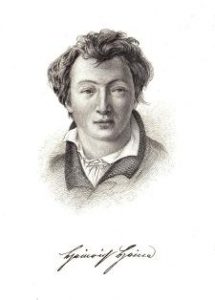
Friedrike
1
Verlaß Berlin, mit seinem dicken Sande
Und dünnen Tee und überwitz’gen Leuten,
Die Gott und Welt, und was sie selbst bedeuten,
Begriffen längst mit Hegelschem Verstande.
Komm mit nach Indien, nach dem Sonnenlande,
Wo Ambrablüten ihren Duft verbreiten,
Die Pilgerscharen nach dem Ganges schreiten,
Andächtig und im weißen Festgewande.
Dort, wo die Palmen wehn, die Wellen blinken,
Am heil’gen Ufer Lotosblumen ragen
Empor zu Indras Burg, der ewig blauen;
Dort will ich gläubig vor dir niedersinken,
Und deine Füße drücken, und dir sagen:
»Madame! Sie sind die schönste aller Frauen!«
2
Der Ganges rauscht, mit klugen Augen schauen
Die Antilopen aus dem Laub, sie springen
Herbei mutwillig, ihre bunten Schwingen
Entfaltend, wandeln stolzgespreizte Pfauen.
Tief aus dem Herzen der bestrahlten Auen
Blumengeschlechter, viele neue, dringen,
Sehnsuchtberauscht ertönt Kokilas Singen –
Ja, du bist schön, du schönste aller Frauen!
Gott Kama lauscht aus allen deinen Zügen,
Er wohnt in deines Busens weißen Zelten,
Und haucht aus dir die lieblichsten Gesänge;
Ich sah Wassant auf deinen Lippen liegen,
In deinem Aug’ entdeck ich neue Welten,
Und in der eignen Welt wird’s mir zu enge.
3
Der Ganges rauscht, der große Ganges schwillt,
Der Himalaja strahlt im Abendscheine,
Und aus der Nacht der Banianenhaine
Die Elefantenherde stürzt und brüllt –
Ein Bild! Ein Bild! Mein Pferd für’n gutes Bild!
Womit ich dich vergleiche, Schöne, Feine,
Dich Unvergleichliche, dich Gute, Reine,
Die mir das Herz mit heitrer Lust erfüllt!
Vergebens siehst du mich nach Bildern schweifen,
Und siehst mich mit Gefühl und Reimen ringen –
Und, ach! du lächelst gar ob meiner Qual!
Doch lächle nur! Denn wenn du lächelst, greifen
Gandarven nach der Zither, und sie singen
Dort oben in dem goldnen Sonnensaal.
Heinrich Heine
(1797-1856)
Friedrike
1823
• fleursdumal.nl magazine
More in: Archive G-H, Archive G-H, Heine, Heinrich
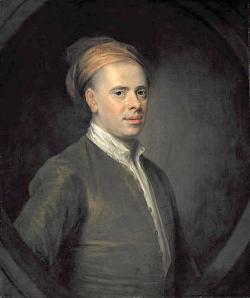
Peggy
My Peggy is a young thing,
Just enter’d in her teens,
Fair as the day, and sweet as May
Fair as the day, and always gay.
My Peggy is a young thing,
And I’m not very auld,
Yet well I like to meet her at
The Wawking of the Fauld.
My Peggy speaks sæ sweetly,
When’er we meet alane,
I wish næ mair to lay my care,
I wish næ mair of a’ that’s rare.
My Peggy speaks sæ sweetly,
To a’ the lave I’m cauld;
But she gars a’ my spirits glow
At Wawking of the Fauld.
My Peggy smiles sæ kindly,
Whene’er I whisper Love,
That I look down on a’ the Town,
That I look down upon a Crown.
My Peggy smiles sæ kindly,
It makes my blythe and bauld,
And naithing gi’es me sic delight,
As Wawking of the Fauld.
My Peggy sings sæ saftly,
When on my pipe I play;
By a’ the rest it is confest,
By a’ the rest, that she sings best.
My Peggy sings sæ saftly,
And in her songs are tald,
With innocence the wale of Sense,
At Wawking of the Fauld.
Allan Ramsay
(1684-1758)
Peggy
• fleursdumal.nl magazine
More in: # Classic Poetry Archive, Archive Q-R, Archive Q-R
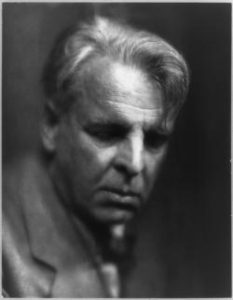
A Coat
I made my song a coat
Covered with embroideries
Out of old mythologies
From heel to throat;
But the fools caught it,
Wore it in the world’s eyes
As though they’d wrought it.
Song, let them take it,
For there’s more enterprise
In walking naked.
William Butler Yeats
(1865-1939)
A Coat
• fleursdumal.nl magazine
More in: Archive Y-Z, Archive Y-Z, Yeats, William Butler
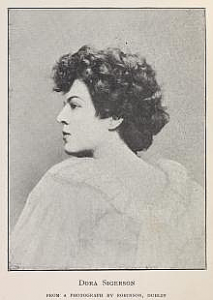
Loud Shout
The Flaming Tongues of war
Ta’n Sionac Ar Sraidib Ag Faire Go Caocrac
Air—“The West’s Asleep.”
Loud shout the flaming tongues of war.
The cannon’s thunder rolls afar
While Empires tremble for their fall.
Thou art alone amongst them all.
Where is the friend who for thy sake
Will on his sword thy freedom take?
The son who holds thy right alone
Above an Empire or a throne?
Ah, Grannia Wael, thy stricken head
Is bowed in sorrow o’er thy dead,
Thy dead who died for love of thee,
Not for some foreign liberty.
Shall we betray when hope is near,
Our Motherland whom we hold dear,
To go to fight on foreign strand,
For foreign rights and foreign land?
The Lion’s fangs have sought to kill
A Nation’s soul, a Nation’s will;
From tooth and claw thy wounded breast
Has held them safe, has held them blest.
About thy head great eagles are,
They fly with scream and storm of war,
Their shadows fall, we do not know
If they be friend,—if they be foe.
For Lion’s roar we have no fears,
We fought him down the restless years.
We watch the Eagles in the sky,
Lest they should land—or pass us by.
But, yet beware! the Lion goes
To strike our friends—to charm our foes.
By hamlet small, by hill and dale
The creeping foe is on our trail;
His face is kind, his voice is bland,
He prates of faith and fatherland;
Shall we go forth to die and die
For Belgium’s tear, and Serbia’s sigh?
Oh, Volunteers, through field and town
He seeks his prey, he tracks thee down
His voice is soft, his words are fair,
It is the creeping foe, Beware!
Ah, Grannia Wael, in blood and tears
We fought thy battles through the years,
That thou shouldst live we’re glad to die
In prison cell or gallows high.
Oh, cursed be he ! who to our shame
Drives forth thy manhood in thy name,
O, WHILE THE LION LAPS YOUR BLOOD
SHALL WE UNITE IN SERVITUDE.
Dora Maria Sigerson Shorter
(1866 – 1918)
Loud Shout The Flaming Tongues of war
• fleursdumal.nl magazine
More in: Archive S-T, Archive S-T, Sigerson Shorter, Dora Maria, WAR & PEACE

Kruisiging in schermopdeling
Mulier, ecce filius tuus … Ecce mater tua.
I
Dismas spreekt naar links. Gestas weigert nors
de bekoring van bekering. Willen die geschieden
gaan hem voorbij in de vaart van het duister. O,
ontraadseling: veel kleiner dan de lucht is huid.
II
Nog maar onlangs was Hij timmermanskind,
glimlachend jong. Nu vertrouwt Hij in Zijn
laatste strijd en nakend onweder de leerling
Zijn moeder, en haar hem toe. Maria’s wenen.
III
Nabij het Schedelveld verschieten hogepriesters
en tollenaren in hun gewaden vol verraad als het
bliksemt, de aarde trilt. Ze erkennen hun nederlaag
wel maar wensen er die naam niet aan te geven.
Bert Bevers
Kruisiging in schermopdeling
Verschenen in Kruiswoorden in Poëziepuntgl, Oosterbeek, 2017
Bert Bevers is dichter en schrijver
Hij woont en werkt in Antwerpen (Be)
• fleursdumal.nl magazine
More in: Archive A-B, Archive A-B, Bevers, Bert
Ferdinand, le héros de Guerre, a quitté la France pour rejoindre Londres, « où viennent fatalement un jour donné se dissimuler toutes les haines et tous les accents drôles ».
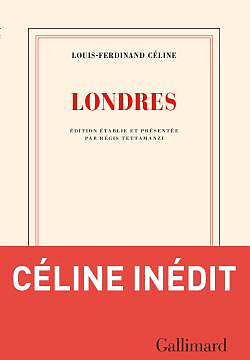 Il y retrouve son amie prostituée Angèle, désormais en ménage avec le major anglais Purcell. Ferdinand prend domicile dans une mansarde de Leicester Pension, où le dénommé Cantaloup, un maquereau de Montpellier, organise un intense trafic sexuel de filles, avec quelques autres personnages hauts en couleur, dont un policier, Bijou, et un ancien poseur de bombes, Borokrom.
Il y retrouve son amie prostituée Angèle, désormais en ménage avec le major anglais Purcell. Ferdinand prend domicile dans une mansarde de Leicester Pension, où le dénommé Cantaloup, un maquereau de Montpellier, organise un intense trafic sexuel de filles, avec quelques autres personnages hauts en couleur, dont un policier, Bijou, et un ancien poseur de bombes, Borokrom.
Proxénétisme, alcoolisme, trafic de poudre, violences et irrégularités en tout genre rendent chaque jour plus suspecte cette troupe de sursitaires déjantés, hantés par l’idée d’être envoyés ou renvoyés au front.
S’il entretient des liens avec Guignol’s band, l’autre roman anglais plus tardif de Céline, Londres, établi depuis le manuscrit récemment retrouvé, s’impose avec puissance comme le grand récit d’une double vocation : celle de la médecine et de l’écriture… Ou comment se tenir au plus près de la vérité des hommes, plongé dans cette farce outrancière et mensongère qu’est la vie.
Louis-Ferdinand Céline
Né en 1894 à Courbevoie, près de Paris, Louis-Ferdinand Céline (pseudonyme de L.-F. Destouches) prépare seul son baccalauréat tout en travaillant. Engagé en 1912, il est gravement blessé en novembre 1914. Invalide à 75 % et réformé, il devient agent commercial et part au Cameroun (1916), puis à Londres (1917).
Après la Victoire, il fait des études de médecine, puis accomplit des missions en Afrique et aux États-Unis pour le compte de la Société des Nations. De retour en France, il exerce la médecine dans la banlieue parisienne et publie en 1932 son premier ouvrage Voyage au bout de la nuit, suivi, en 1936, de Mort à crédit.
De 1944 à 1951, Céline, exilé, vit en Allemagne et au Danemark. Revenu en France, il s’installe à Meudon où il poursuit son œuvre (D’un château l’autre, Nord, Rigodon) et continue à soigner essentiellement les pauvres. Il meurt en 1961.
Louis-Ferdinand Céline
Londres
Édition de Regis Tettamanzi
Collection Blanche, Gallimard
Parution : 13-10-2022
576 pages
Grand format: 140 x 205 mm
Littérature française
Époque : XXe siècle
ISBN : 9782072983375
Gencode : 9782072983375
Code distributeur : G06460
€ 24.00
• fleursdumal.nl magazine
More in: - Book News, - Bookstores, Archive C-D, Louis-Ferdinand Céline
Parmi les manuscrits de Louis-Ferdinand Céline récemment retrouvés figurait une liasse de deux cent cinquante feuillets révélant un roman dont l’action se situe dans les Flandres durant la Grande Guerre.
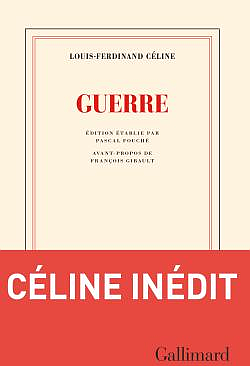 Avec la transcription de ce manuscrit de premier jet, écrit quelque deux ans après la parution de Voyage au bout de la nuit (1932), une pièce capitale de l’œuvre de l’écrivain est mise au jour. Car Céline, entre récit autobiographique et œuvre d’imagination, y lève le voile sur l’expérience centrale de son existence : le traumatisme physique et moral du front, dans l’« abattoir international en folie ».
Avec la transcription de ce manuscrit de premier jet, écrit quelque deux ans après la parution de Voyage au bout de la nuit (1932), une pièce capitale de l’œuvre de l’écrivain est mise au jour. Car Céline, entre récit autobiographique et œuvre d’imagination, y lève le voile sur l’expérience centrale de son existence : le traumatisme physique et moral du front, dans l’« abattoir international en folie ».
On y suit la convalescence du brigadier Ferdinand depuis le moment où, gravement blessé, il reprend conscience sur le champ de bataille jusqu’à son départ pour Londres. À l’hôpital de Peurdu-sur-la-lys, objet de toutes les attentions d’une infirmière entreprenante, Ferdinand, s’étant lié d’amitié au souteneur Bébert, trompe la mort et s’affranchit du destin qui lui était jusqu’alors promis.
Ce temps brutal de la désillusion et de la prise de conscience, que l’auteur n’avait jamais abordé sous la forme d’un récit littéraire autonome, apparaît ici dans sa lumière la plus crue. Vingt ans après 14, le passé, « toujours saoul d’oubli », prend des « petites mélodies en route qu’on lui demandait pas ». Mais il reste vivant, à jamais inoubliable, et Guerre en témoigne tout autant que la suite de l’œuvre de Céline.
Louis-Ferdinand Céline
Né en 1894 à Courbevoie, près de Paris, Louis-Ferdinand Céline (pseudonyme de L.-F. Destouches) prépare seul son baccalauréat tout en travaillant. Engagé en 1912, il est gravement blessé en novembre 1914. Invalide à 75 % et réformé, il devient agent commercial et part au Cameroun (1916), puis à Londres (1917).
Après la Victoire, il fait des études de médecine, puis accomplit des missions en Afrique et aux États-Unis pour le compte de la Société des Nations. De retour en France, il exerce la médecine dans la banlieue parisienne et publie en 1932 son premier ouvrage Voyage au bout de la nuit, suivi, en 1936, de Mort à crédit.
De 1944 à 1951, Céline, exilé, vit en Allemagne et au Danemark. Revenu en France, il s’installe à Meudon où il poursuit son œuvre (D’un château l’autre, Nord, Rigodon) et continue à soigner essentiellement les pauvres. Il meurt en 1961.
Louis-Ferdinand Céline
Guerre
Édition de Pascal Fouché.
Avant-propos de François Gibault
Collection Blanche, Gallimard
Parution : 05-05-2022
192 pages
ill.
140 x 205 mm
Littérature française
Époque: XXe siècle
ISBN: 9782072983221
Gencode: 9782072983221
Code distributeur: G06457
€ 19,00
• fleursdumal.nl magazine
More in: - Book News, - Bookstores, Archive C-D, Louis-Ferdinand Céline
Thank you for reading Fleurs du Mal - magazine for art & literature